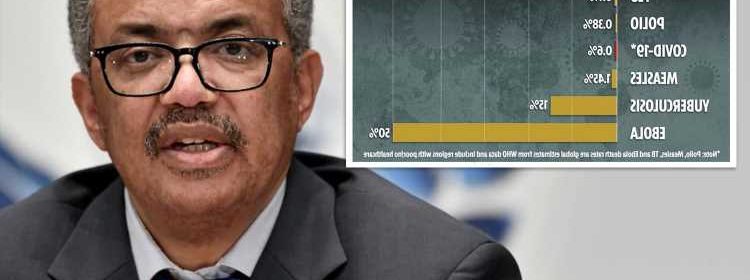World Health Organisation warns coronavirus kills 0.6% of patients & there 'may never be silver bullet' vaccine for bug

THE World Health Organisation has said there may never be "a silver bullet" vaccine for treating coronavirus – and claimed the bug kills 0.6% of patients.
Dr Tedros Adhanom Ghebreyesus, the chief of the health body, issued the stark warning earlier today as countries across the globe rush to find a vaccine for Covid-19.
⚠️ Read our coronavirus live blog for the latest news & updates
Dr Ghebreyesus told a virtual briefing in Geneva earlier today that there is a chance that a vaccine may never be found for the bug which has killed over 688,000 people worldwide and infected more than 18 million.
While he praised the significant efforts made by scientists across the globe in ramping up clinical trials for possible vaccines, he remained sceptical that rolling one out in a short timeframe would be easy.
In its place, he urged governments to continue with containment measures such as contact tracing, quarantining and mass testing.
Dr Tedros said: "The message to people and governments is clear: Do it all.
"A number of vaccines are now in phase three clinical trials and we all hope to have a number of effective vaccines that can help prevent people from infection.
There is no silver bullet at the moment and there might never be
"However, there's no silver bullet at the moment – and there might never be."
He added: "There are concerns that we may not have a vaccine that may work, or its protection could be for just a few months, not more.
"But until we finish the clinical trials, we will not know."
The WHO head said that, while the coronavirus was the biggest health emergency since the early 20th century, the international scramble for a vaccine was also "unprecedented".
VACCINE RACE
Some of the world's largest economies are locked into the race for a vaccine, with the likely contenders hailing from Oxford University as well as US-based firm Moderna.
Oxford scientists believe they have made a breakthrough in their quest for a vaccine after discovering that the jab triggers a response that offers a "double defence" against the virus.
The Telegraph reported that phase one of the vaccine has shown that it generates an immune response against the disease.
Imperial College, meanwhile, is also involved in two clinical trials testing a vaccine against Covid-19, led by Professor Robin Shattock.
But experts have reminded the public that, even when a vaccine shows promise, several stages of trials will be needed to confirm it is safe ahead of an international rollout – which is unlikely to be until 2021.
At the same briefing, the WHO's most senior epidemiologist said that officials believe that the infection kills 0.6% of all patients.
This makes the disease six times more deadly than seasonal flu.
Dr Maria Van Kerkhove, the WHO's technical lead, said that the true fatality rate was difficult to measure due to the amount of unknown coronavirus patients.
Different scientists have thus far provided different estimations of the mortality rate for Covid-19, with academics from Cambridge University previously stating it could be as high as 1.4%, the Mail reports.
Dr Mike Ryan, executive director of WHO's Health Emergencies Programme, said that the estimate of 0.6% meant "just over one in 200 people infected, potentially dying".
It comes as the pandemic accelerates in many parts of the globe, despite national lockdowns slowing the spread in most nations.
The US has seen a dramatic surge in cases, recording a staggering 67,000 new infections yesterday with states such as Florida and Texas particularly hard-hit.
Other countries with high transmission rates, such as Brazil and India, were also urged to "reset" by Dr Ryan as their government's struggle to bring infections down.
Most read in Health News
RULE CHANGE Everything you can and can't do after Covid rules changed TODAY
Rebecca Loos looks unrecognisable after 'David Beckham affair' scandal
Mum's agony after son, 5, 'stabbed to death' as cops quiz woman on murder
Half a million forced to apply for more jobs or risk Universal Credit cut
Infections are also creeping up across Europe, with fears of a second wave growing in Spain which is seeing around 1,000 new cases a day in the past week.
An ominous rise in cases in the North West of England also forced the PM to reimpose a ban on meeting other households inside their homes – as Downing Street considers a raft of new measures to keep the virus at bay.
Source: Read Full Article











